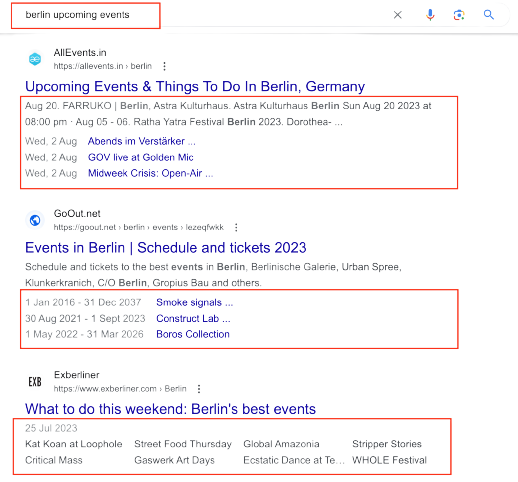How to Add Structured Data Markup for Events – Boost Your Website’s Search Visibility
What is Structured Data Markup?
Structured data markup, also known as schema markup or simply schema, is a way of annotating or tagging content on a web page to provide search engines with more detailed information about the page’s content. It uses a standard vocabulary or set of codes (called schema types) that help search engines understand the context and meaning of the data on the page.
By adding structured data markup to a website’s HTML code, webmasters and developers can communicate important details about their content, such as product information, reviews, events, recipes, articles, and more. Search engines like Google, Bing, Yahoo, and others use this structured data to enhance search results and present more informative and visually appealing rich snippets or knowledge graph cards.
Structured data markup not only improves the visibility and appearance of search results but also helps search engines understand the relationships between different pieces of content on a website. It contributes to better SEO (Search Engine Optimization) by making it easier for search engines to index and rank relevant information accurately.
The most widely used format for structured data markup is called JSON-LD (JavaScript Object Notation for Linked Data), although other formats like Microdata and RDFa have been used in the past.
Overall, structured data markup is an essential tool for webmasters and businesses looking to improve their website’s search engine visibility and provide users with more valuable and precise search results.
Structured Data – Type “EVENT”
1. What is the “Event” Schema?
The Event Schema is a specific type of structured data markup from schema.org, a collaborative project by major search engines including Google, Bing, and Yahoo. The Event Schema defines a set of properties and values that can be used to describe events, such as the event name, location, start date, end date, description, and more.
2. What are the benefit of Implementing an “Event” Schema on your website?
Please try to make a queries in google and find out yourself. For example, I made a simple search query in google for “Berlin upcoming events” and this is what appears on google.

How is that possible? Simple answer is because of “Event” type Schema Structured Data.
Below are some benefits of implementing “Event” Schema on your website:
Improved Search Visibility:
Implementing Event Schema can make your events more visible in search engine results, as search engines can better understand and display the event details in rich snippets.
Enhanced Search Result Display:
When your events have structured data markup, search engines may display additional information in search results, such as event dates, location, and even a link to directly book tickets or RSVP. Rich snippets and enhanced search displays can attract more attention from users, leading to higher click-through rates to your website.
3. How to implement Event Schema on your website?
Identify Event Pages:
Determine which pages on your website contain event information that you want to mark up with Event Schema. Typically, these pages would be event listings, event details, or individual event pages.
Understand Event Schema Markup:
Review the Event Schema documentation on schema.org to understand the different properties available and how they should be used.The most recommended way to add structured data markup is using JSON-LD format. It involves adding a snippet of JSON code to the HTML of your event pages. Each property in the JSON-LD code corresponds to the relevant event information (e.g., name, description, location, start date, end date, etc.).
Test Your Markup:
Before deploying the structured data on your live website, use Google’s Structured Data Testing Tool or the Rich Results Test to check for any errors or warnings in your markup. After implementing the Event Schema, keep an eye on your website’s performance in search results. Check for any changes in search visibility, click-through rates, and overall user engagement.
Conclusion:
Remember to adhere to the guidelines and best practices provided by schema.org and the specific recommendations of search engines to ensure your structured data markup is correctly implemented. Additionally, always keep your structured data up-to-date to reflect accurate event information.
